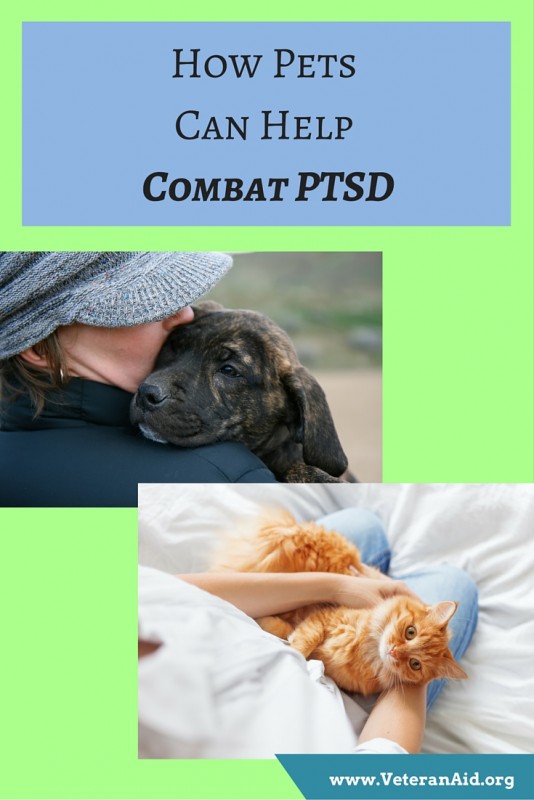How Pets Can Help Combat PTSD
Posted in Uncategorized on March 14, 2016
Tags: military, ptsd, tips for caregivers, tips for seniors, veterans
Transitioning back to civilian life can be a complicated process for a veteran. He or she is, of course, happy to return home and no longer be in active danger, but many find it difficult to talk to friends and family about the things they have seen or done. Some may find that the life they knew seems to have moved on without them, leaving them lonely and wondering about their next step. Others find it hard to release the hyper-awareness they were required to develop during combat for survival.
home and no longer be in active danger, but many find it difficult to talk to friends and family about the things they have seen or done. Some may find that the life they knew seems to have moved on without them, leaving them lonely and wondering about their next step. Others find it hard to release the hyper-awareness they were required to develop during combat for survival.
Whatever the reason, many veterans struggle with deep depression, anxiety, and PTSD, leading to the tragic statistic that a veteran commits suicide every 65 minutes. Thankfully, researchers are beginning to find good statistic support for the idea that a pet can help veterans struggling with PTSD. Along with increased serotonin levels (thought to aid in stabilizing mood and helping with sleep) in veterans after interacting with service pets, pets offer many helpful benefits to their veteran owners.
Pets are naturally soothing. Non-judgmental and easy-to-please, dogs and cats are thrilled whenever their owner comes home for the day. Sitting on the couch becomes an invitation for a hangout session, so you are truly never alone, even if you’re simply watching tv in the middle of the night because you can’t sleep. If you don’t feel like talking, a pet doesn’t mind, as long as you’re willing to throw a ball or even just sit and pet them. Many service dogs can even be trained to sense when their owner is agitated or being overcome with anxiety, and will jump into action to interact with them and break the emotionally tense moment.
Pets are naturally vigilant. You could argue the value of a cat in this situation, but dogs especially tend to be naturally alert and aware of their surroundings and any out-of-the-norm noises. Many veterans find they can finally rest knowing that their dog is there to alert them of anything suspicious, even if the likelihood of danger is realistically very low. In the combat zone, perhaps the veteran had to be constantly on-guard, even during down periods. It can be difficult turning that off. Knowing that another hyper-vigilant creature is on watch can help a veteran finally be able to relax.
Pets must be trained with assertiveness but not aggression. Upon returning from active duty – especially from the theater of war – some veterans struggle with finding the balance between being assertive and being aggressive. In combat situations, the distinction is not always important, unlike in civilian life. When training a dog, however, a veteran can relearn how to give commands and be firm without tapping into survival mode. Some experimental programs, like Paws for Purple Hearts, pair veterans with service dogs being trained to help other veterans with combat-related injuries, and are seeing benefits to both the animal and the trainers.
Pets can reactivate affection. In battle or very rough deployment situations, people often find themselves buckled down into a numb, survival mode. There is little room for affection and unnecessary gestures, so returning home to a family or a loved one can be a challenge. Because pets are so trustworthy and trusting of their owners (and let’s be honest, they can be unyielding in their attempts to make you pet them), the ability to let down protective emotional walls and reach out in affection may come more easily. The next step is moving that display of affection to friends and family who desperately want that to be a part of their relationship with the veteran.
Pets are dependent on their owners. Not only do pets love their owners, they depend on them to provide basic care on a daily basis. For veterans struggling with loneliness or a lack of purpose and routine in their civilian life, having another living soul depending on them can help them hold on to hope in the darkest moments. Your cat or dog will be expecting you to feed it every day at a certain time; they may need to be walked, washed, or just given affection. Knowing that someone would miss you if you were suddenly gone, or needs you every day – even if that someone is a special pet – can be enough to help someone struggling to hold on for one more day and find the help they need.
Having a pet for a veteran is truly be more than just a luxury; it might be a lifeline to help him or her transition back into civilian life and combat the hidden but dangerous emotional struggles so many experience. With love and affection, a pet can offer a veteran almost as much care as it receives.
Written by Megan Hammons

3 Responses to “How Pets Can Help Combat PTSD”
Leave a Reply
You must be logged in to post a comment.



[…] Still, there was the residual pain left from the lack of a warm welcome home. As these young men and women transitioned back into 1960s, some attended universities on the G.I. Bill and came face to face with students who were vocal and oftentimes lacking in the perspective of what it is to be a member of the military. Others looked for work with varying degrees of success, while still others suffered silently with what was then the little-known PTSD. […]
[…] in support groups, medical care, but others may need a different type of assistance. This is where a constant companion, such as a service dog may fill a need in your veteran’s life. Service dogs offer comfort, […]
[…] add enjoyment to their owners’ lives, offer a sense of stability and loyalty, and even help reduce the symptoms of PTSD. Whether you are a single person or have several kids chasing your pet around the yard, that animal […]